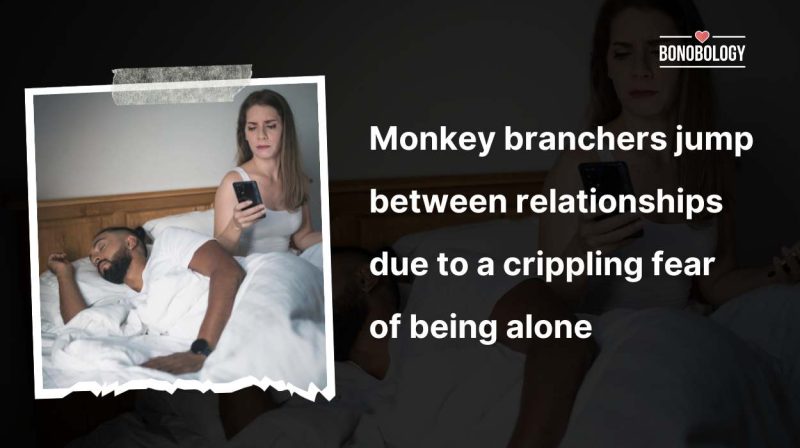As I sit down to write about monkey branching, a term that has made waves in the world of relationships and dating, I can’t help but recall personal experiences and those of friends who’ve navigated the complex terrain of love and commitment. It’s a concept that hits close to home for many, as we’ve witnessed the tumultuous effects of monkey branching behavior on our own past relationships.
Whether you’ve been the one left hanging from the branch or you’ve contemplated the leap yourself, the emotional rollercoaster of monkey branching is something that resonates with countless individuals. In this article, we’ll delve into its meaning and explore the psychology behind it, helping you identify its signs and ways to deal with it.
What Is Monkey Branching In Relationships?
Table of Contents
Monkey branching in relationships refers to a behavior where one partner (the monkey brancher) seeks a new romantic connection before ending the previous relationship. This often stems from a fear of being alone or a desire for emotional safety, resulting in overlapping relationships. It can lead to emotional turmoil and complex dynamics, impacting all parties involved.
According to one study, “People high on attachment anxiety are more likely to be involved in extradyadic relationships due to their high fear of being single, possibly as a bet-hedging strategy to minimize future risk of being single.”
Now that we understand what this phenomenon is, let’s look at the six stages of monkey branching, why people do it, and whether or not it is a form of cheating.
Related Reading: 15 Warning Traits Of A Serial Cheater – Run If You Spot These
Six Stages Of Monkey Branching
Understanding the dynamics of this phenomenon in relationships involves recognizing the stages a monkey brancher typically goes through. These six stages of monkey branching offer insights into the progression of this behavior, shedding light on the emotional journey one may experience as one branches out from relationship to relationship.
- Dissatisfaction and doubt: The first stage often begins with one partner feeling dissatisfied or having doubts about the current relationship to the point where they may start questioning their feelings and the longevity of the partnership
- Exploration: In this stage, the individual begins actively seeking new connections or potential partners while still in the existing committed relationship, engaging in flirtatious behaviors and exploring new avenues without commitment
- Emotional disconnect: As the pursuit of a new relationship intensifies, the person may experience a lack of emotional connection from their current partner, become distant, less invested, and may even pick fights as a way to justify their departure
- Overlapping relationships: At this point, the individual engages in new relationships before the old relationship ends, creating an overlap that can lead to dishonesty, betrayal, and emotional turbulence for all parties involved
- The leap: This is the moment when the individual decides to make the leap from the old relationship to the new one, which can be abrupt, causing shock and heartbreak for the current partner left behind
- Remorse or justification: After the transition to the next relationship, a monkey brancher may experience remorse for their actions or attempt to justify them
It’s like being in a perpetual rebound relationship with a series of different partners. The emotional aftermath that constitutes these six stages of monkey branching varies widely, but it’s crucial to understand the impact of monkey swinging and possibly even how long do monkey branch relationship last.
Why Do People Monkey Branch?
Why do people monkey branch? Do monkey branching relationships last? How long do monkey branch relationship last? These are questions that delve into the intricate motivations driving this complex relationship behavior. Understanding the underlying reasons can shed light on the emotional and psychological factors that lead individuals to engage in monkey branching, a phenomenon that can have profound implications for those involved.

When a guy or a girl is monkey branching, it could be for a multitude of reasons:
- Fear of loneliness is a powerful motivator, as individuals may jump from one relationship to another to avoid the discomfort of being alone
- Emotionally unfulfilled in their current partnership, they seek solace in new connections, hoping to find the happiness that eludes them
- Insecurity within the current relationship can also drive monkey branching behavior, as they may lack confidence in its stability or quality
- Opportunistic monkey branching can occur when an unexpected chance for a new relationship presents itself, leading individuals to make hasty decisions
- Low self-esteem or poor communication and unresolved issues in the current relationship might cause them to seek emotional connections elsewhere
- Additionally, dating apps have made it much easier to engage in this kind of behavior
The desire for excitement and novelty, coupled with the ego boost received from a new partner, can further fuel this desire to seek validation elsewhere — it gives the monkey brancher the feeling of having a higher status. This is monkey branching psychology 101. Understanding these motivations underscores the importance of fostering open communication, self-awareness, and healthy relationship practices to address the root causes of monkey branching and ultimately build stronger, more resilient connections.
But do monkey branching relationships last? Monkey branching relationships typically have a lower probability of lasting in the long term. This behavior often indicates a lack of commitment and emotional investment in the current relationship, as one partner seeks emotional security or fulfillment elsewhere. Such relationships are built on shaky foundations, and the emotional strain caused by overlapping relationships or quick transitions can make it challenging to sustain them. Nevertheless, a monkey brancher is rarely single because one branch is never enough.
Related Reading: 11 Common Reasons People Cheat In Relationships
Is Monkey Branching Cheating?
The question of whether a monkey brancher is a cheater or not is a subject of ethical and moral debate. Monkey branching meaning the overlap of one romantic involvement with another creates a gray area in which the boundaries of commitment are blurred.
It is considered cheating because the monkey brancher is engaging in a romantic or sexual relationship with someone outside the boundaries of an existing committed relationship, without the knowledge or consent of all involved parties. While a monkey brancher may not engage in physical cheating, they often indulge in emotional cheating. Cheating is often a refuge for people who have low self-esteem or do not have strong morals.
According to one Reddit user, “If they are monkey branching, they are cheating. The biggest signs I noticed after 6 years on/off together:
- His communication dropped significantly. He was distant. Never made plans
- He would go MIA and be very vague about wanting “me time”. He wouldn’t tell me what he was doing or talk to me at all about what he did when we were apart. Vague answers like “Did things around the house, why do you always want to know?” Most partners will volunteer what they’re up to
- Defensiveness when I’d ask or mention something felt off. He would instantly get angry and call me interrogative, refused to talk to me about my concerns or why I was feeling that way
- The phone was always on silent/taken off Bluetooth in the car
- He was caught on dating apps
- I followed him one day. He did not go where he said he was and that was the nail in the coffin
“He went on to leave me for her when I confronted him. 2 years later, he came back saying what a mistake and blah blah. I was stupid and told him we could work through it as I knew he had some mental health issues then. He did it again 4 months later. Showed a lot of the same signs and I didn’t bother confirming it, I listened to my gut and left. Blocked him after he got mad, once again, at me for raising the change in behavior.”
Monkey branchers often lack a strong moral compass and this is a big deal because a guy like this will likely treat other girls the same way as the previous one.
7 Signs Of Monkey Branching
What is monkey branching in relationships? Recognizing the signs of monkey branching is pivotal for anyone navigating the world of relationships. These seven telltale indicators offer valuable insights into identifying when a partner may be contemplating or actively engaging in the behavior. Being attuned to these signs and understanding monkey branching psychology can help individuals make informed decisions and better protect their emotional well-being.
1. Emotional distance
One of the most poignant indicators of a monkey brancher is the palpable emergence of emotional detachment within a relationship. This phenomenon can be characterized by a significant and concerning shift in the emotional connection that once bound you and your current partner.
Where you once shared your deepest thoughts, desires, and feelings, you now find a growing chasm of detachment. A monkey-branching wife/husband/partner becomes increasingly reserved, less available for meaningful conversations, and disengaged from the emotional fabric of the relationship. This is a sign that they may start flirting with someone else.
2. Lack of affection
A noticeable lack of affection within a relationship is a sign of potential monkey branching, meaning a partner is losing interest. It manifests in the diminishing of physical gestures of love and warmth that were once integral to the partnership. A monkey branching wife/girlfriend/husband/boyfriend may begin giving less affection and dialing back on gestures such as hugs, kisses, or cuddling, which previously served as tangible expressions of their love and emotional connection.
This newfound scarcity of physical intimacy can create a sense of alienation and foster emotional discord, leaving you to grapple with feelings of rejection and isolation. It not only erodes the emotional bond you once shared but may indicate that your current partner is redirecting their romantic and emotional energy toward a new relationship, thereby deepening the emotional rift between you. Addressing this sign promptly is crucial for either mending the current relationship or preparing for the difficult conversations that lie ahead.
Related Reading: Expert Tips On How To Increase Physical Intimacy In A Relationship
3. Absence of intimacy
The absence of intimacy is a key sign of monkey branching, reflecting a profound emotional disconnect within the current relationship, and is a major red flag. It’s characterized by a dwindling desire or ability to share one’s innermost thoughts, feelings, and concerns with a partner. Conversations that were once meaningful and fulfilling may become superficial or rare.
When a guy/girl is monkey branching, the lack of emotional intimacy can leave you feeling isolated and unfulfilled, as he/she grows disinterested in the emotional connection that was once a cornerstone of your relationship. It’s a telltale sign that they may be seeking emotional fulfillment and a deeper connection elsewhere, making it imperative to address the issue openly and honestly to either rebuild the intimacy or navigate the challenges that lie ahead.
4. Decline in quality time
A noticeable reduction in quality time spent together is another prominent sign of a monkey brancher. Your partner, who once valued your companionship, might now prioritize other activities or individuals over nurturing your shared bond. This shift can lead to feelings of neglect and emotional distance, as the moments that used to strengthen your connection are replaced with a growing sense of isolation.
Whether it’s done under the pretext of work, new acquaintances, or other interests, the bottom line is that they seem to be more interested in doing their own thing like often taking calls when they’re with you.
Related Reading: 11 Tips To Build A Successful Relationship After Cheating
5. Not making plans together
When your partner stops making plans with you, immediate or long-term, they could be a monkey brancher. If they’re no longer excited by the prospect of doing things with you — be it going to the movies over the weekend, planning a holiday for the summer, or talking about what the future may look like five years down the road — it shows a clear detachment on their part.
This detachment suggests that your partner may be channeling their emotional energy toward new romantic interests, emphasizing the need for candid communication to either rekindle the romance or address the evolving dynamics in your relationship.
6. Apathy or indifference
Apathy or indifference in a relationship is perhaps the most obvious sign of monkey branching. Your partner will lose interest or concern for your well-being, happiness, or the dynamics of the relationship. Your emotional needs may no longer be a priority to them, and they may show little empathy or understanding toward your feelings and concerns or future as a couple.
They could also engage in secretive behavior, or share increasingly negative thoughts, as they pursue a new person. It’s essential to address this sign promptly, whether to reignite their emotional engagement or to confront the reality of changing relationship dynamics and just break up.

How To Deal With A Monkey Branching Relationship
Navigating monkey branching in a relationship can be emotionally challenging, but it’s possible to address your partner’s behavior change with care and consideration:
- Open communication: Initiate an honest and open conversation with your partner. Express your concerns and feelings without judgment and ask them about their motivations and emotions to gain a better understanding of the situation
- Self-reflection: Take time for self-reflection to assess your own needs and boundaries within the relationship to better understand what you’re willing to tolerate and what you need to feel secure and fulfilled
- Seek support: Reach out to friends and family for emotional support. Having a strong support system can provide you with guidance, perspective, and a safe space to express your feelings through this rough patch
- Set boundaries: If you decide to work on the relationship, establish clear boundaries and expectations for both partners; transparency is crucial in rebuilding trust
- Seek professional help: If the relationship feels irreparable, couples therapy or counseling can be a valuable resource since a trained therapist can facilitate productive discussions and help both partners navigate the challenges
- Self-care: Prioritize self-care to maintain your emotional and mental well-being and engage in activities that bring you joy, reduce stress, and boost self-worth
- Evaluate the relationship: Ultimately, assess whether the relationship aligns with your long-term goals and values; sometimes, it’s necessary to make the difficult decision to end the relationship and prioritize your happiness and well-being
Key Pointers
- Monkey branching is the phenomenon of seeking a new romantic connection before ending an existing one
- Low self-esteem, unmet needs, fear of being alone, insecurity, and opportunistic behavior are some factors that cause a person to monkey branch in relationships
- Emotional distance, lack of intimacy, indifference, and detachment are some clear indicators of a partner monkey branching
- A monkey branching relationship needs to be dealt with open and honest communication, allowing both partners to express their feelings without judgment
Remember that dealing with a monkey branching relationship can be emotionally draining, and there’s no one-size-fits-all solution. The key is to make choices that align with your values and goals, ensuring that your emotional and mental health remains a top priority throughout the process. Whether you decide to work on the relationship or move forward independently, the experience can serve as an opportunity for growth, self-discovery, and, ultimately, a healthier and more fulfilling future.
How To Forgive A Cheating Partner? 7 Tips To Heal And Move On
Your contribution does not constitute a charitable donation. It will allow Bonobology to continue bringing you new and up-to-date information in our pursuit of helping anyone in the world to learn how to do anything.
Ask Our Expert
You must be Logged in to ask a question.


Featured
5 Best Cheating Spouse Tracker Apps (Android & iPhone)
How To Catch A Cheater That Deletes Everything: 12 Hacks
33 Signs Of Micro-Cheating — Is Your Partner Guilty Of These?
7 Therapist-Approved Things To Do If Your Boyfriend Is Cheating On You
11 Heartbreaking Signs Your Husband Misses His Affair Partner
Should You Forgive A Cheater? 8 Factors To Consider
How Can You Tell If Your Fiancé Is Cheating? 15 Signs To Look Out For
Is Marriage Never The Same After Infidelity?
13 Uncommon Signs of Cheating People Wish They Hadn’t Ignored
15 Cell Phone Cheating Signs That Confirm Infidelity
Gut Feeling He’s Cheating, No Proof? 31 Signs Your Instincts Are On Point
Painful Message To A Cheating Boyfriend: 50 Brilliant Ideas
Is Flirting Cheating? 9 Reasons It Is And 7 Ways It Can Harm Your Relationship
What To Do If You Suspect Your Husband Is Cheating But Have No Proof
Understanding Post-Infidelity Stress Disorder – Signs and Recovery Tips
15 Signs Your Husband Is Cheating On You With A Coworker
The 7 Types of Affairs and How They Affect Relationships
15 Warning Traits Of A Serial Cheater – Run If You Spot These
When Is Texting Cheating? 11 Different Scenarios And How To Deal
Micro-cheating: Meaning, Examples, Signs, And Ways To Deal